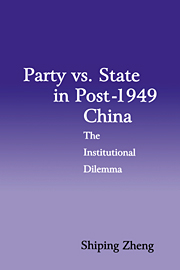Book contents
- Frontmatter
- Contents
- List of Tables
- Acknowledgments
- List of Abbreviations
- Part I Introduction
- 1 Understanding the State and Party in China
- 2 Where did the Chinese State Come From?
- Part II State-building under a Revolutionary Party: The Mao Zedong Era
- Part III State-building under a Reformist Party: The Deng Xiaoping Era
- Conclusions
- Appendix A CCP Membership Changes, 1921–96
- Appendix B Campaigns in China, 1950–89
- Bibliography
- Index
1 - Understanding the State and Party in China
Published online by Cambridge University Press: 23 September 2009
- Frontmatter
- Contents
- List of Tables
- Acknowledgments
- List of Abbreviations
- Part I Introduction
- 1 Understanding the State and Party in China
- 2 Where did the Chinese State Come From?
- Part II State-building under a Revolutionary Party: The Mao Zedong Era
- Part III State-building under a Reformist Party: The Deng Xiaoping Era
- Conclusions
- Appendix A CCP Membership Changes, 1921–96
- Appendix B Campaigns in China, 1950–89
- Bibliography
- Index
Summary
THE collapse of the Communist regimes in Eastern Europe and the Soviet Union highlights the issue of state-building in today's world politics. As one quickly discovers, building the state institutions after Communism is anything but easy. Newly elected leaders in the former Communist countries have faced formidable challenges, as they realized how much still needed to be done in this “third wave of state formation.” Decades of Communist rule seem to have contributed little, if anything, to institutional development. Everything has to start from scratch: negotiating the rules of the game, establishing political authorities, defining power relationships, learning how to convene parliaments as well as how to behave like a parliamentarian. Meanwhile, from the pointless bombardment of the parliament in Russia to the senseless ethnic war in former Yugoslavia, and from escalating lawlessness in the center to rising outcry for breakup in the periphery, we have witnessed in recent years the devastating consequences of state institutional breakdown.
Against this background, China seems to be doing very well: At an average of 9 percent per year over the past sixteen years, the Chinese economy was the fastest growing in the world; market reform had been deepening, despite or perhaps because of the tragedy in Tiananmen Square in 1989; foreign investments poured in and Chinese products rushed out. Much of the booming economy, of course, hinges upon the Communist Party's grip on power in China.
- Type
- Chapter
- Information
- Party vs. State in Post-1949 ChinaThe Institutional Dilemma, pp. 3 - 22Publisher: Cambridge University PressPrint publication year: 1997

